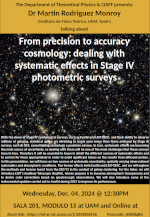With the dawn of Stage IV cosmological surveys, such as Euclid and LSST-DESC, and their ability to observe millions of galaxies, statistical errors are shrinking to levels even lower than those achieved by Stage III surveys, such as DES, consolidating cosmology a precision science. In turn, systematic effects are becoming the main source of uncertainty, so dealing with them will be one of the main challenges that these surveys have to face. Therefore it will be essential to know in detail the different sources of systematic effects and to correct for them appropriately in order to avoid significant biases on the results from different probes. In this presentation, we will focus on two sources of systematic uncertainty: spatially varying observational systematics and atmospheric conditions. The former affects both Euclid and LSST-DESC, and we will explore the methods and lessons learnt from the DES-Y3 in the context of galaxy clustering. For the latter, we will introduce LSST’s Auxiliary Telescope (AuxTel), whose purpose is to measure atmospheric transparency and to derive color corrections based on spectroscopic observations. We will also introduce some of the instrumental updates carried out in AuxTel during 2023 to improve its performance.

